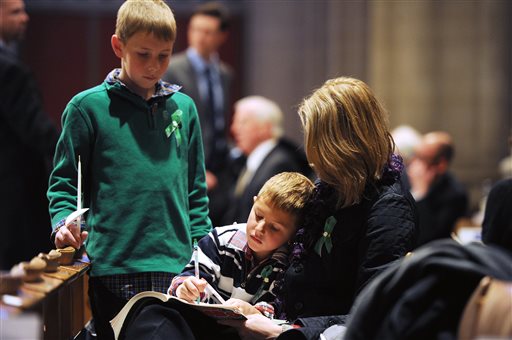A year after Newtown, still more ricochets
Saturday, December 14, 2013
Even as news accounts reminded readers and viewers Friday that today will mark the one-year anniversary of the shooting massacre at a Newtown, Conn., elementary school, another school shooting was occurring in Colorado.
In Newtown last year, 20 first-graders and six teachers at Sandy Hook Elementary were killed when mentally disturbed Adam Lanza, 20, went into the school with 10, 30-round magazines for his semiautomatic Bushmaster .223 caliber model XM15 rifle and bullets for his two handguns. Lanza already had killed his mother at their home. After he shot his way into the school and killed 26 -- in less than five minutes, firing one bullet roughly every two seconds -- he killed himself.
At Arapahoe High School in Centennial, Colo., on Friday, at least two people were injured and a third person, a male student who was the shooter, died of an apparently self-inflicted gunshot, according to early news reports.
Between those two events, nearly one year apart, at least 11,457 people have died because of gun violence -- and probably many more. That's just the number Slate, an online magazine, has matched and confirmed in a project to track and map gun deaths nationwide using Internet data and news reports.
But by extrapolating the most recent CDC estimates for yearly deaths by guns in the United States, it is likely that as of Thursday, Dec. 12, roughly 33,173 people have died from guns in the U.S. since the Newtown shootings, according to Slate.
Yet gun control -- which just after Newtown had a 90 percent public approval rating specifically for expanded background checks -- still failed in Congress this year. And at state levels, gun rights groups won more votes to loosen gun restrictions than gun control groups won to toughen them.
Of the 109 state laws passed this year, only 39 tightened gun restrictions and 70 loosened them, according to a New York Times analysis. Just six states -- most solidly Democratic -- enacted new gun control measures. Tennessee and Georgia were among states that loosened gun laws. Georgia voted to recognize concealed-carry permits from other states and made permit records confidential. Tennessee, too, made concealed-carry permit records confidential. In Alabama, gun rights won a small victory when state lawmakers voted to require sheriffs to approve or deny permit applications within 30 days and to explain any rejections.
But gun control advocates -- and the families of Newtown victims -- say the fight isn't over, and in fact it has picked up steam.
"The families of Newtown, with their courage and their leadership, have helped ignite a movement. They've opened the eyes and opened the hearts of Americans. It may take longer for Congress to get that message, but I assure you the American people do," Connecticut Rep. Elizabeth Esty told television reporters Friday.
Polls showed 58 percent supported some general gun control legislation in the weeks after Newtown. Now, support for general gun control has dropped back to about 52 percent, a more traditional level. Recent polls show 38 percent of those surveyed say gun laws should remain the same, and only 8 percent say laws should be less strict.
But Esty said the continuing effort to pass universal gun checks for purchasing firearms "will depend on the political courage or political cowardice of my (congressional) colleagues."
The NRA and other gun lobby organizations also have stepped up the push to loosen laws, and in Colorado, three state lawmakers resigned rather than face recall over their votes to toughen the law there. It will be interesting in coming days to see what impact the Friday Arapahoe High School shooting brings.
So far, sadly, all the shootings and all the public opinion polls have been outdone by the jingle of political contributions.
On the federal level, gun rights-related contributions -- much of which is funded by gun and ammunition makers -- outstripped gun control-related contributions by more than 10 to 1 from 1989 to 2012, according to the Sunlight Foundation. At the state level, gun rights contributions were 31 times that of gun control contributions. And in the past year, gun rights groups at both state and federal levels outspent gun control groups 12-to-1.
In Newtown this week the families of the victims asked Americans to remember their children and educators with "an act of kindness" today -- perhaps volunteering with a charity or with a cause in their communities.
"We hope that some small measure of good may be returned to the world," one mother said.

